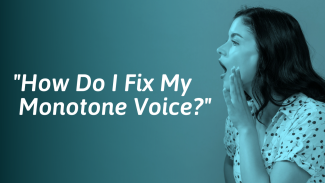“Whenever I speak, it seems like people can’t understand me. I think I’m speaking loudly and clearly, but everyone tells me that I’m quiet and mumbling. I wish I could just speak up. How do I speak properly and clearly?”
Mumbling during conversations can feel really awkward. You might feel like you’re speaking super loudly, but people keep asking you to speak up. Mumbling is usually a combination of trying to speak too quickly, too quietly, and without moving your mouth enough.
What is mumbling a sign of?
Mentally, mumbling is often a sign of shyness and a lack of confidence. It can also be due to over-exuberance or nerves, with fast speech and words merging into each other. Physically, mumbling can be due to hearing difficulties, fatigue, or a lack of control of breathing or facial muscles.
How do you stop yourself from mumbling?
To stop mumbling, you can do exercises to improve your enunciation and project your voice. Improving your confidence and changing how you think about conversations can also help.
I’m going to go into how you can do all of these things in real, achievable steps.
1. Be sure that you really do mumble
Recording your voice can make it easier to be sure whether you mumble or not. If you are worried about being too quiet, include a noise such as a clap at the start of the recording. This gives you a reference to help you set an accurate volume level when you are listening back. Have some background noise, such as having some music on quietly, when you play your recording to see whether you can be heard clearly.
Other clues that you probably mumble include:
- People ask you to repeat yourself a lot
- People sometimes take a few seconds to work out what you said before replying
- People can’t understand you in a noisy environment
- People often mishear what you said
2. Understand your mumbling
Understanding why you mumble can help you to focus your efforts on the most helpful skills.
Why do I mumble?
People mumble for many reasons. You might lack confidence, struggle to believe that others want to listen to you, not want to draw attention to yourself, or worry about saying the wrong thing. You might struggle to form words clearly because of a lack of practice or physical issue.
Try really thinking about which reasons apply to you, or whether you have reasons I haven’t mentioned. I’d love to hear about them in the comments if you do.
If you’re not sure, try speaking loudly and clearly when you are alone. If this is easy, you are probably worried about not being interesting or saying the wrong thing. If you feel embarrassed trying, you might be shy and not want to draw attention to yourself. If you are comfortable trying but find it physically difficult, you might want to work most on the physical skills.
The relationship between mumbling and confidence is often circular. You mumble because you lack confidence but you then feel embarrassed because you mumble. Working on your physical skills as well as your confidence gives you twice as many chances to improve.
3. Focus on where you are facing
Although you probably think of mumbling as being solely about the sound of your voice, where you are facing has a huge effect on whether people can understand you. Making sure that you face the person you are speaking to will reduce many of the effects of mumbling.
When you face someone, it’s easier for the sound to travel to their ears. If you look at the floor or turn away, your voice is automatically quieter because less vibration reaches the other person.
Most of us actually read lips more than we realize.[1] You can test this yourself. Try closing your eyes while watching TV. Voices will probably seem unclear and mumbled. Looking at the person you are speaking to makes it easier for them to understand what you’re saying.
You don’t need to stare. Just try to make sure that your mouth is visible and that there is a straight line between your face and theirs.
4. Practice the physical skills of enunciation
Practicing pronouncing words clearly will help you to be understood, even if you don’t increase your volume at all. There are lots of different exercises and suggestions for how to stop slurring words, but here are a few of my favorites.
The pen trick
Practice holding a pen or a cork in your mouth while you try to speak. Hold it lightly between your front teeth. You will probably slur when you first start, but as you practice, you will start to pronounce all syllables in each word, making you easier to understand.
Tongue twisters
There are lots of options for tongue twisters. For the quickest results, select ones that you find particularly difficult. Start by saying the sentences slowly, taking as long as you need to get it right. Gradually speed up your repetitions, trying to go as quickly as you can without errors. Some of my favorites are:
- She sells sea shells on the sea shore
- Round and round the rugged rocks the ragged rascal ran
- If a dog chews shoes, whose shoes does he choose?
If you want to really challenge yourself, you can also try to keep up with a song that contains tongue twisters.
If you continue to struggle with the physical side of enunciation, you might want to find a speech therapist to help you find the best exercises for you.
5. Learn to project your voice
Breathing from the diaphragm helps you to project your voice, increasing your volume without sounding like you are shouting. I find it helpful not to think about trying to be “louder.” Instead, I think about making my voice reach the person I am speaking to.
If you have a friend to help you, practice standing about 50 feet away from each other, either in a large room or outside. Try to hold a conversation at that distance without shouting. If 50 feet is too far, start closer to each other and build up slowly.
6. Allow your mouth to move
Not moving your mouth enough when you are speaking makes it difficult for you to produce clear speech. You might not move your mouth when speaking because you are embarrassed about your teeth, worried about bad breath, or have a physical problem with your jaw muscles. Other people have simply fallen into the habit of speaking with minimal mouth movements, maybe because of teasing when they were young.
If there is an underlying reason for not wanting to move your mouth, you may want to take specific advice, for example, from your dentist.
Trying to move your mouth more when you speak will probably feel highly exaggerated. This is normal. Next time you’re watching TV, pay attention to how much the actors’ lips and mouths move when they are speaking. When you watch closely, you realize just how much movement there is in normal speech.
Practice moving your lips and mouth more while speaking. I would do this alone at first, focusing on how you sound and ignoring how you look. Once you are happy with the way you sound, you can start looking in the mirror while you practice.
7. Slow down
Mumbling is often due to speaking too quickly. You might be shy and want to finish speaking as soon as possible, or you might be enthusiastic or even suffer from ADHD. When you speak too quickly, you don’t finish a word before you start the next one. This can make it difficult for others to understand.
Slow your speech by finishing each word before you start the next. Pronounce the first and last letters of each word clearly. You’ll feel stilted at first, but you’ll learn to speak slower and more clearly. Speaking with a slightly lower pitch than usual can slow your speech.
8. Warm up
Speaking requires control of lots of different muscles; your diaphragm, your lungs, your vocal cords, your tongue, your mouth, and your lips. Warming these muscles up can give you more control and avoid your voice ‘cracking.’
There are loads of vocal warm-up exercises that you can try, and lots of these will help you enunciate better as well. In fact, your daily warm-up can be really helpful in reminding you to practice speaking clearly every day.
Even just humming or singing your favorite song in the shower will help you to prepare your voice for speaking clearly later in the day.
9. Trust that others are interested
Lots of us can enunciate when we focus but find that we still mumble sometimes, especially if we are nervous. We sometimes doubt that other people really want to hear what we have to say.
The next time you start to worry that the other person doesn’t care, remind yourself that they are choosing to be part of the conversation. Try to make a conscious decision to trust that they are listening and interested. Working on your underlying confidence can really help with this.
Reassure yourself that others are there by choice
You might be thinking, “I’ve been trapped in conversations I didn’t want to be in before. What if they’re just being polite?” One trick I use is to offer a polite exit from the conversation. I might say
“I’m enjoying talking to you, but I know you’re busy. We could pick this up again later if you’d prefer?”
If they stay, it’s easier to believe that they’re interested.
10. Believe in what you want to say
You might also mumble because, subconsciously, you’re not sure about what you’re saying. When you’re worried about saying something stupid, you can mumble as a way of saying, “Don’t pay attention to me.”[2]
Remember that conversations are about letting people in, even just a little bit. Practice opening up and being honest without being overly vulnerable. Try to deal with any underlying worries about saying the wrong thing.
Practice speaking out
Starting to build the courage to say what you really believe, and to stand up for those beliefs, can build a deep level of confidence. When you feel more confident, you may be less likely to mumble. Viktor has a great example of how he stood up for what he believed and how much stronger it made him feel.
This might seem scary, but each time you manage it, you are increasing your core confidence and sense of self-worth.





